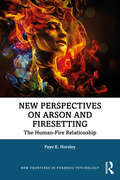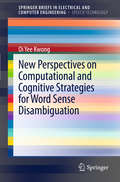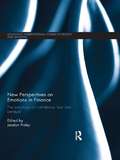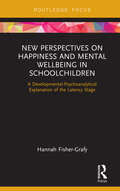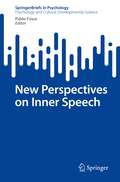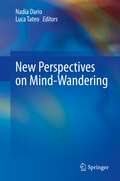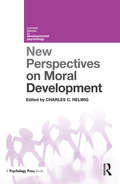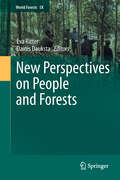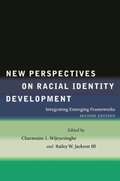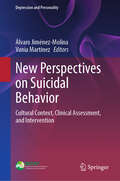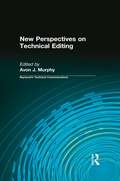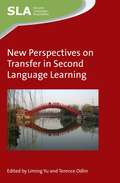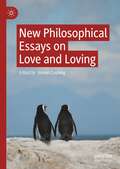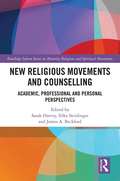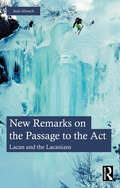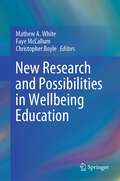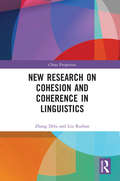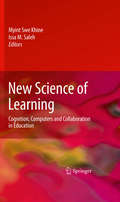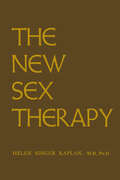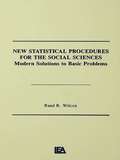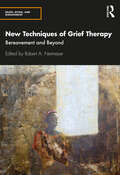- Table View
- List View
New Perspectives on Arson and Firesetting: The Human-Fire Relationship (New Frontiers in Forensic Psychology)
by Faye K HorsleyNew Perspectives on Arson and Firesetting: The Human-Fire Relationship is the first forensic text to move away from a sole focus on anti-social firesetting. The author presents a broader investigation of the role of fire in human life with a view to informing research and practice. This book examines the evolutionary, psychological and social significance of fire. Drawing on interdisciplinary literature and original research data, it challenges the existing understanding of arson and firesetting. A new concept – fire use – is introduced, which is conceptualised as sitting on a continuum from non-criminalised to criminalised behavior. The author combines her experience as a practitioner forensic psychologist with her own research to consider the practical application of an alternative perspective. This includes a particular focus on the assessment and treatment of fire setters and a call for a socially informed approach to prevention. The forensic scope, applied focus, and emphasis on the importance of interdisciplinary research and practice makes New Perspectives on Arson and Firesetting essential reading for students in fields such as anthropology, sociology, criminology, and psychology, as well as interdisciplinary scholars, forensic practitioners, and allied professionals. The author is donating her royalties in full to Pancreatic Cancer UK.
New Perspectives on Computational and Cognitive Strategies for Word Sense Disambiguation
by Oi Yee KwongCognitive and Computational Strategies for Word Sense Disambiguation examines cognitive strategies by humans and computational strategies by machines, for WSD in parallel. Focusing on a psychologically valid property of words and senses, author Oi Yee Kwong discusses their concreteness or abstractness and draws on psycholinguistic data to examine the extent to which existing lexical resources resemble the mental lexicon as far as the concreteness distinction is concerned. The text also investigates the contribution of different knowledge sources to WSD in relation to this very intrinsic nature of words and senses.
New Perspectives on Emotions in Finance: The Sociology of Confidence, Fear and Betrayal (Routledge International Studies in Money and Banking #76)
by Jocelyn PixleyThe financial crisis that started in 2007 is a concern for the world. Some countries are in depression and governments are desperately trying to find solutions. In the absence of thorough debate on the emotions of money, bitter disputes, hatred and ‘moralizing’ can be misunderstood. New Perspectives on Emotions in Finance carefully considers emotions often left unacknowledged, in order to explain the socially useful versus de-civilising, destructive, nature of money. This book offers an understanding of money that includes the possible civilising sentiments. This interdisciplinary volume examines what is seemingly an uncontrollable, fragile world of finance and explains the ‘panics’ of traders and ‘immoral panics’ in banking, ‘confidence’ of government and commercial decision makers, ‘shame’ or ‘cynicism’ of investors and asymmetries of ‘impersonal trust’ between finance corporations and their many publics. Money is shown to rely on this abstract trust or ‘faith’, but such motivations are in crisis with ‘angry’ conflicts over the ‘power of disposition’. Restraining influences – on ‘uncivilised emotions’ and rule breaking – need democratic consensus, due to enduring national differences in economic ‘sentiments’ even in ostensibly similar countries. Promising ideas for global reform are assessed from these cautionary interpretations. Instead of one ‘correct’ vision, sociologists in this book argue that corporations and global dependencies are driven by fears and normless sentiments which foster betrayal. This book is not about individuals, but habitus and market crudities. Human ‘nature’ or ‘greed’ cannot describe banks, which do not ‘feel’ because their motivations are not from personal psyches but organisational pressures, and are liable to switch under money’s inevitable uncertainties. This more inclusive social science studies emotions as a crucial factor among others, to expand the informed public debate among policy makers, bankers, academics, students and the public.
New Perspectives on Happiness and Mental Wellbeing in Schoolchildren: A Developmental-Psychoanalytical Explanation of the Latency Stage
by Hannah Fisher-GrafyNew Perspectives on Happiness and Mental Wellbeing in Schoolchildren presents a revolutionary approach to handling social rejection during the latency period. It offers the reader an innovative educational approach, adapted to this pre-adolescent age group, for systemic intervention in classes experiencing negative social phenomena. Presenting latency as a significant developmental stage, it explains children’s cruelty in social rejection from a developmental perspective. The book presents the "Envelopes" therapy method to improve children’s status immediately and proposes a school intervention for social rejection. It also offers an educational approach appropriate to the developmental needs of latency age children. The approaches described are based on a new developmental psychology paradigm that can illuminate latency with far-reaching insights that aid in adapting approaches suitable to this age. This new paradigm of significant and unique intrapsychic development during early childhood asserts that the most important human development occurs during latency. With informative case studies used throughout, this book will be of great interest to academics and researchers in the fields of clinical psychology, educational psychology, and teacher training.
New Perspectives on Human Development
by Carlson Katherine Cecilia Wainryb Stephanie M. Nancy Budwig Elliot Turiel Zelazo Philip David Carlson Stephanie M. Nasir Na’ilah Suad Nelson Philip David Nasir Na’ilah Suad Katherine NelsonDevelopmental theorists have struggled with defining the relations among biology, psychology, and sociocultural context, often reducing psychological functions of a person to either biological functioning or the role of sociocultural context - nature or nurture - and considering each area of human development separately. New Perspectives on Human Development addresses fundamental questions of development with a unified approach. It encompasses theory and research on cognitive, social and moral, and language and communicative development, in various stages of life, and explores interdisciplinary perspectives. New Perspectives on Human Development revisits old questions and applies original empirical findings, offering new directions for future research in the field.
New Perspectives on Inner Speech (SpringerBriefs in Psychology)
by Pablo FossaInner speech has been a focus of multidisciplinary interest. It is a long-standing phenomenon of study in philosophy, psychology, and anthropology. Researchers from different disciplines have turned their efforts to understand this inherent experience of being "talking to oneself". In psychology, Vygotsky managed to develop a complete description of the phenomenon, giving rise to a great line of research related to inner speech in the human experience. Including a compilation of theoretical and empirical advances related to inner speech phenomenon, this book is aimed at academics and researchers in the area of psychology, education and culture. This book will be of interest to international research programs, related to cultural psychology, socio-constructivism, developmental psychology and education.
New Perspectives on Malthus
by Robert J. MayhewThomas Robert Malthus (1766–1834) was a pioneer in demography, economics and social science more generally whose ideas prompted a new 'Malthusian' way of thinking about population and the poor. On the occasion of the two hundred and fiftieth anniversary of his birth, New Perspectives on Malthus offers an up-to-date collection of interdisciplinary essays from leading Malthus experts who reassess his work. Part one looks at Malthus's achievements in historical context, addressing not only perennial questions such as his attitude to the Poor Laws, but also new topics including his response to environmental themes and his use of information about the New World. Part two then looks at the complex reception of his ideas by writers, scientists, politicians and philanthropists from the period of his own lifetime to the present day, from Charles Darwin and H. G. Wells to David Attenborough, Al Gore and Amartya Sen.
New Perspectives on Mind-Wandering
by Luca Tateo Nadia DarioIn the last decade, a great variety and volume of scholarly work has appeared on mind-wandering, a mental process involving a vast range of human life, connected with “first-person perspective” and “personhood”, submental thinking, mental autonomy, etc. While different and emerging features that flow into and out of one another (second field, mental travel, visual imagery, inner speech, unspecific memory, autobiographical memory, fantasies, introspection, etc.) and negative and positive approaches seem to describe mind-wandering, we offer an interdisciplinary theoretical and empirically informed and informative overview on mind-wandering studies and methodologies oriented toward the educational field. The aim is to transform and enrich the debate on mind-wandering but also to show how theoretical arguments and research findings could inform the teaching-learning context.This groundbreaking book, moves along three representations of developed scientific knowledge: imaginary lines, circles and spirals. The first section, “The Lines”, develops new lines of inquiry on attention (selective and sustained) and mind-wandering, the influence of age and mind-wandering, embodiment, consciousness and experience and mind-wandering. In the second section, the “Circles”, groups of Chapters on the same topic, methodology (tasks and measurement), intervention (auditory beat stimulation and mindfulness practices) and creativity, recreate a dance of interacting parts in which there are always profitable, decisive and retroactive exchanges between the information that each group or author activates. The last section, “The Spirals”, critically discusses the absence of a unified theoretical perspective, in the pedagogical field, attentive both to the processes of emergence and the interactions between parts.
New Perspectives on Moral Development (Current Issues in Developmental Psychology)
by Charles C. HelwigThis volume presents a selection of some of the most exciting new perspectives on moral development that have emerged over the last decade and have transformed our understanding of the field. The contributors to this book cut across traditional boundaries to provide an innovative and integrative approach to fundamental questions dealing with the nature and acquisition of morality. In addressing these questions, the chapters draw on new work on the origins of morality in infancy and the early years, comparative approaches examining morality in primates, new perspectives on moral emotions such as guilt and empathy, and new perspectives on the emerging moral self in childhood and moral identity in adolescence. The book also examines the roles of parenting and culture in children’s and adolescents’ moral development. Each chapter is framed in theory and methodology and provides illustrative examples of new research to address important questions in the field. This book is essential reading for researchers and advanced undergraduate and postgraduate students studying moral development and developmental psychology. It will also be of interest to academics and professionals in related fields such as education and public policy.
New Perspectives on People and Forests
by Dainis Dauksta Eva RitterThe aim of this book is to elucidate the role of forests as part of a landscape in the life of people. Most landscapes today are cultural landscapes that are influenced by human activity and that in turn have a profound effect on our understanding of and identification with a place. The book proposes that a better understanding of the bond between people and forests as integrated part of a landscape may be helpful in landscape planning, and may contribute to the discussion of changes in forest cover which has been motivated by land use changes, rural development and the global climate debate. To this end, people's perception of forest landscapes, the reasons for different perceptions, and future perspectives are discussed. Given the wide range of forest landscapes, and cultural perspectives which exist across the world, the book focuses on Europe as a test case to explore the various relationships between society, culture, forests and landscapes. It looks at historical evidence of the impacts of people on forests and vice versa, explores the current factors affecting people's physical and emotional comfort in forest landscapes, and looks ahead to how changes in forest cover may alter the present relationships of people to forests. Drawing together a diverse literature and combining the expertise of natural and social scientists, this book will form a valuable reference for students and researchers working in the fields of landscape ecology and landscape architecture, geography, social science, environmental psychology or environmental history. It will also be of interest to researchers, government agencies and practitioners with an interest in issues such as sustainable forest management, sustainable tourism, reserve management, urban planning and environmental interpretation.
New Perspectives on Racial Identity Development
by Bailey W. Jackson Charmaine L. WijeyesingheNew Perspectives on Racial Identity Development brings together leaders in the field to deepen, broaden, and reassess our understandings of racial identity development. Contributors include the authors of some of the earliest theories in the field, such as William Cross, Bailey W. Jackson, Jean Kim, Rita Hardiman, and Charmaine L. Wijeyesinghe, who offer new analysis of the impact of emerging frameworks on how racial identity is viewed and understood. Other contributors present new paradigms and identify critical issues that must be considered as the field continues to evolve. <p><p> This new and completely rewritten second edition uses emerging research from related disciplines that offer innovative approaches that have yet to be fully discussed in the literature on racial identity. Intersectionality receives significant attention in the volume, as it calls for models of social identity to take a more holistic and integrated approach in describing the lived experience of individuals. <p> This volume offers new perspectives on how we understand and study racial identity in a culture where race and other identities are socially constructed and carry significant societal, political, and group meaning.
New Perspectives on Suicidal Behavior: Cultural Context, Clinical Assessment, and Intervention (Depression and Personality)
by Vania Martínez Álvaro Jiménez-MolinaThis book offers a comprehensive overview of current research, clinical practice, and prevention efforts related to suicidal behavior. The first section of the book focuses on theoretical frameworks and sociocultural dimensions, exploring the subjective experiences of suicidal thoughts and behaviors within diverse social contexts. It examines theoretical models, the role of personality disorders, and perspectives from indigenous communities, as well as the experiences of transgender and gender non-conforming individuals, highlighting their implications for research and clinical practice. The second section focuses on clinical assessment and psychosocial interventions for suicide risk. It provides tools for early detection, evaluation, and intervention, while also addressing prevention and postvention strategies across various settings. Additionally, it explores the growing role of digital technologies in suicide prevention and treatment, offering insights into their potential applications and impact. Suicide is a significant global public health issue, claiming over 700,000 lives each year. It accounts for approximately 1.3% of all deaths, with around 80% occurring in low- and middle-income countries. In this context, the United Nations&’ Sustainable Development Goals (SDGs) have prioritized reducing suicide mortality as a key target for improving global health by 2030. New Perspectives on Suicidal Behavior: Cultural Context, Clinical Assessment, and Intervention is designed for clinical psychologists, psychiatrists, and other mental health students and professionals, advocating for a shift toward multidimensional, culturally informed frameworks to enhance the understanding, assessment, and intervention of suicidal behavior across diverse contexts.
New Perspectives on Technical Editing
by Charles H Sides Avon J MurphyNew Perspectives on Technical Editing provides readers with a rich picture of a thriving discipline. Its 10 chapters are written by various experts in the field, each of whom looks at technical editing from a distinct vantage point, setting challenging questions and offering authoritative recommendations based on experience and research. Contributors examine significant approaches to the practice and teaching of technical editing: the recommended research methodologies, the not entirely straightforward history of technical editing, effective approaches to developing editing courses, the politics of editing within today's organizations, the definition and on-the-job work of copyediting, the power of electronic editing, the complex nature and best practices of science editing, and the nuts and bolts of successfully editing technical journals. Readers will find insights into background literature, trends, responsibilities, workflow, legal issues, ethics, tricks of the trade, unanticipated complications, business know-how, considerations of audience, interpersonal relations, and strategies for different media that they can apply in their own work and research. Each contributor provides substantive chapter references, and the book's annotated bibliography describes and evaluates 100 of the most influential and useful editing resources.
New Perspectives on Transfer in Second Language Learning
by Terence Odlin Liming YuWhen people attempt to learn a new language, the language(s) they already know can help but also hinder their understanding or production of new forms. This phenomenon, known as language transfer, is the focus of this book. The collection offers new theoretical perspectives, some in the empirical studies and some in other chapters, and consists of four sections considering lexical, syntactic, phonological and cognitive perspectives. The volume provides a wealth of studies on the influence of Chinese on the acquisition of English but also includes studies involving Finnish, French, Hindi, Korean, Persian, Spanish, Swedish and Tamil. It will be of great interest to researchers and students working in the areas of crosslinguistic influence in second language acquisition, language pedagogy and psycholinguistics.
New Perspectives on Type Identity
by Christopher S. Hill Simone GozzanoThe type identity theory, according to which types of mental state are identical to types of physical state, fell out of favour for some years but is now being considered with renewed interest. Many philosophers are critically re-examining the arguments which were marshalled against it, finding in the type identity theory both resources to strengthen a comprehensive, physicalistic metaphysics and a useful tool in understanding the relationship between developments in psychology and new results in neuroscience. This volume brings together leading philosophers of mind, whose essays challenge in new ways the standard objections to type identity theory, such as the multiple realizability objection and the modal argument. Other essays show how cognitive science and neuroscience are lending new support to type identity theory and still others provide, extend and improve traditional arguments concerning the theory's explanatory power.
New Philosophical Essays on Love and Loving
by Simon CushingNew philosophical essays on love by a diverse group of international scholars. Topics include contributions to the ongoing debate on whether love is arational or if there are reasons for love, and if so what kind; the kinds of love there may be (between humans and artificial intelligences, between non-human animals and humans); whether love can explain the difference between nationalism and patriotism; whether love is an necessary component of truly seeing others and the world; whether love, like free will, is “fragile,” and may not survive in a deterministic world; and whether or not love is actually a good thing or may instead be a force opposed to morality. Key philosophers discussed include Immanuel Kant, Iris Murdoch, Bernard Williams, Harry Frankfurt, J. David Velleman, Niko Kolodny, Thomas Hurka, Bennett Helm, Alfred Mele and Derk Pereboom. Essays also touch on the treatment of love in literature and popular culture, from Graham Greene’s The End of the Affair to Spike Jonze’s movie her.
New Religious Movements and Counselling: Academic, Professional and Personal Perspectives (Routledge Inform Series on Minority Religions and Spiritual Movements)
by James A. Beckford Sarah Harvey Silke SteidingerThere are many different ways in which minority religions and counselling may interact. In some cases there can be antagonism between counselling services and minority religions, with each suspecting they are ideologically threatened by the other, but it can be argued that the most common relationship is one of ignorance – mental health professionals do not pay much attention to religion and often do not ask or consider their client’s religious affiliation. To date, the understanding of this relationship has focused on the ‘anti-cult movement’ and the perceived need for members of minority religions to undergo some form of ‘exit counselling’. In line with the series, this volume takes a non-judgemental approach and instead highlights the variety of issues, religious groups and counselling approaches that are relevant at the interface between minority religion and counselling. The volume is divided into four parts: Part I offers perspectives on counselling from different professions; Part II offers chapters from the field leaders directly involved in counselling former members of minority religions; Part III offers unique personal accounts by members and former members of a number of different new religions; while Part IV offers chapters on some of the most pertinent current issues in the counselling/minority religions fields, written by new and established academics. In every section, the volume seeks to explore different permutations of the counsellor-client relationship when religious identities are taken into account. This includes not only ‘secular’ therapists counselling former members of religion, but the complexities of the former member turned counsellor, as well as counselling practised both within religious movements and by religious movements that offer counselling services to the ‘outside’ world.
New Remarks on the Passage to the Act: Lacan and the Lacanians
by Jean AllouchNew Remarks on the Passage to the Act considers what happens when psychoanalysis and the social sciences are called on to help modern societies overwhelmed by unexplained violence.Jean Allouch examines key events – the crimes of the Papin sisters, Lacan’s case of Aimée and the murder of Hélène Rytmann by Louis Althusser – and unpacks the concept of the "passage to the act". The book assesses these classic cases, resorting to contemporaneous studies and literature, particularly discussing Marguerite Duras’ novel L’Amante Anglaise. The book also considers modern acts of terrorism.New Remarks on the Passage to the Act will be of great interest to clinicians, academics and scholars of psychoanalysis, Lacanian studies, sociology, cultural studies and philosophy, and to Lacanian analysts in practice and in training.
New Research and Possibilities in Wellbeing Education
by Christopher Boyle Mathew A. White Faye McCallumThis book examines a variety of issues related to wellbeing education and cross-cultural education, curriculum and pedagogy, education policy and systems, teacher education and professional development of educators, educational administration, management and leadership, and inclusive education. Stimulated, in part, by the launch of positive psychology, wellbeing education has grown worldwide. Various theories of wellbeing have been adopted in education, coining the term 'wellbeing education', defined in this book as how school leaders and teachers plan to implement evidence-informed wellbeing interventions to promote wellbeing and academic goals. This book investigates a series of questions related to wellbeing education, and how evidence-informed wellbeing approaches are integrated into learning, teaching, and education.
New Research on Cohesion and Coherence in Linguistics (China Perspectives)
by Zhang Delu Liu RushanThe study of text cohesion and coherence has been a topic of heated discussion in Linguistics since the 1990s. Western linguists have developed two major theoretical frameworks to describe the relationship between the two concepts: one posits that cohesive devices are important means to ensure cohesion; the other argues that coherence does not rely on cohesion. Yet neither has complete explanatory power over reality; nor can they solve real-life problems. This title proposes a creative, concrete, and highly operational theoretical model that unites cohesion and coherence using authentic English or Chinese examples. The authors clarify the concepts of coherence and expand the scope of the research by focusing on a variety of internal and external factors, such as psycho-cognitive and socio-cultural factors. Moreover, the authors propose that the new theoretical paradigm can be applied to a range of other disciplines, including translation and foreign language teaching. This title has been one of the most cited works on cohesion and coherence in China. Students and scholars of discourse analysis, linguistics, and language education will find this an invaluable reference.
New Research on Parenting Programs for Low-Income Fathers
by Jay FaganThis book presents state-of-the-art findings of research on fatherhood programs, funded by the Fatherhood Research and Practice Network (FRPN), which advance knowledge and practice in the fathering field. New Research on Parenting Programs for Low-Income Fathers includes research on how to engage mothers to support father–child contact and to successfully employ social media and online technology for practice. It offers findings on how to increase paternal engagement and parenting skills and to include fathers in policies and programs for children and families. It discusses the importance of providing staff training and resources to practitioners who work directly with fathers. Chapters also provide summaries of key implications for evidence-based practice and future directions for research that encourage effective fatherhood practice. This book is an excellent resource for therapists, social workers, fatherhood educators, fatherhood practitioners, researchers, and policy makers on how to inspire positive father engagement with children and healthy coparenting relationships.
New Science of Learning
by Myint Swe Khine Issa M. SalehThe earliest educational software simply transferred print material from the page to the monitor. Since then, the Internet and other digital media have brought students an ever-expanding, low-cost knowledge base and the opportunity to interact with minds around the globe--while running the risk of shortening their attention spans, isolating them from interpersonal contact, and subjecting them to information overload. The New Science of Learning: Cognition, Computers and Collaboration in Education deftly explores the multiple relationships found among these critical elements in students' increasingly complex and multi-paced educational experience. Starting with instructors' insights into the cognitive effects of digital media--a diverse range of viewpoints with little consensus--this cutting-edge resource acknowledges the double-edged potential inherent in computer-based education and its role in shaping students' thinking capabilities. Accordingly, the emphasis is on strategies that maximize the strengths and compensate for the negative aspects of digital learning, including: Group cognition as a foundation for learning Metacognitive control of learning and remembering Higher education course development using open education resources Designing a technology-oriented teacher professional development model Supporting student collaboration with digital video tools Teaching and learning through social annotation practices The New Science of Learning: Cognition, Computers and Collaboration in Education brings emerging challenges and innovative ideas into sharp focus for researchers in educational psychology, instructional design, education technologies, and the learning sciences.
New Sex Therapy: Active Treatment Of Sexual Dysfunctions
by Helen Singer KaplanFirst published in 1975. Routledge is an imprint of Taylor & Francis, an informa company.
New Statistical Procedures for the Social Sciences: Modern Solutions To Basic Problems
by Rand R. WilcoxThis unique volume addresses the inadequacies of basic statistical methods that standard textbooks tend to ignore. The author introduces new procedures with accompanying tables that illustrate the practicality of the methods. Concentrating on basic experimental designs that are central to research in the social sciences, Wilcox describes new nonparametric techniques, two-way ANOVA designs, and new results related to the analysis of covariance and repeated measure design. This book serves as the ideal reference and supplement to standard texts by making the statistical advances of the last thirty years accessible to graduate students and researchers.
New Techniques of Grief Therapy: Bereavement and Beyond (Series in Death, Dying, and Bereavement)
by Robert A. NeimeyerNew Techniques of Grief Therapy: Bereavement and Beyond expands on the mission of the previous two Techniques books, featuring innovative approaches to address the needs of those whose lives have been shadowed by loss—whether through bereavement, serious illness, the rupture of a relationship, or other complex or intangible losses, such as of an identity-defining career. The book starts with several framing chapters by prominent theorists that provide a big- picture orientation to grief work and follows with a generous toolkit of creative therapeutic techniques described in concrete detail and anchored in illustrative case studies to convey their use in actual practice. New Techniques of Grief Therapy is an indispensable resource for professionals working in hospice, hospital, palliative care, and elder care settings; clinicians in broader health-care and mental health-care practices; executive coaches; and students in the field of grief therapy.
